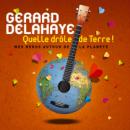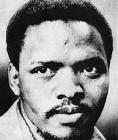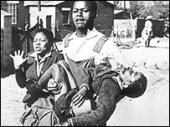1.
Senzeni na?
Sono sethu, ubumyama?
Sono sethu yinyaniso?
Sibulawayo
Mayibuye iAfrika
2.
Senzeni na senzeni na
Senzeni na senzeni na
Senzeni na senzeni na
Senzeni na kulomhlaba?
Amabhulu azizinja
Amabhulu azizinja
Amabhulu azizinja
Amabhulu azizinja
Kuyisono ‘kubamnyama
Kuyisono ‘kubamnyama
Kuyisono ‘kubamnyama
Kuyisono kulelizwe
Senzeni na?
Sono sethu, ubumyama?
Sono sethu yinyaniso?
Sibulawayo
Mayibuye iAfrika
2.
Senzeni na senzeni na
Senzeni na senzeni na
Senzeni na senzeni na
Senzeni na kulomhlaba?
Amabhulu azizinja
Amabhulu azizinja
Amabhulu azizinja
Amabhulu azizinja
Kuyisono ‘kubamnyama
Kuyisono ‘kubamnyama
Kuyisono ‘kubamnyama
Kuyisono kulelizwe
envoyé par Riccardo Venturi - 11/7/2010 - 02:00
Langue: anglais
English Translations from en:wikipedia
WHAT HAVE WE DONE?
1.
What have we done?
Our sin is that we are black?
Our sin is the truth
They are killing us
Let Africa return
2.
What have we done, what have we done?
What have we done, what have we done?
What have we done, what have we done?
What have we done in this country (world)?
Boers are dogs
Boers are dogs
Boers are dogs
Boers are dogs
It’s a sin to be black
It’s a sin to be black
It’s a sin to be black
It’s a sin in this country (world)
1.
What have we done?
Our sin is that we are black?
Our sin is the truth
They are killing us
Let Africa return
2.
What have we done, what have we done?
What have we done, what have we done?
What have we done, what have we done?
What have we done in this country (world)?
Boers are dogs
Boers are dogs
Boers are dogs
Boers are dogs
It’s a sin to be black
It’s a sin to be black
It’s a sin to be black
It’s a sin in this country (world)
envoyé par Riccardo Venturi - 11/7/2010 - 02:03
Langue: italien
Traduzione italiana dell'Anonimo Toscano del XXI Secolo
6 dicembre 2017 11:12
Dice l'AT-XXI: La prima strofa è in lingua Zulu, la seconda in lingua Xhosa; ma le due lingue sono molto simili e mutualmente intelligibili (anche lo Zulu ha i click, ma sono molto meno presenti che nello Xhosa; in questa canzone, comunque, non ce n'è nemmeno uno). La traduzione è letterale per quanto riguarda la parte in Xhosa, con un paio di note.
6 dicembre 2017 11:12
Dice l'AT-XXI: La prima strofa è in lingua Zulu, la seconda in lingua Xhosa; ma le due lingue sono molto simili e mutualmente intelligibili (anche lo Zulu ha i click, ma sono molto meno presenti che nello Xhosa; in questa canzone, comunque, non ce n'è nemmeno uno). La traduzione è letterale per quanto riguarda la parte in Xhosa, con un paio di note.
CHE ABBIAMO FATTO?
1.
Che cosa abbiamo fatto?
Il nostro peccato, è che siamo neri?
Il nostro peccato è la verità?
Ci stanno ammazzando
L'Africa ritorni
2.
Che abbiamo fatto, che abbiamo fatto
Che abbiamo fatto, che abbiamo fatto
Che abbiamo fatto, che abbiamo fatto
I Boeri [1] sono cani
I Boeri sono cani
I Boeri sono cani
È un peccato essere neri
È un peccato essere neri
È un peccato essere neri
È un peccato in questa terra [2]
1.
Che cosa abbiamo fatto?
Il nostro peccato, è che siamo neri?
Il nostro peccato è la verità?
Ci stanno ammazzando
L'Africa ritorni
2.
Che abbiamo fatto, che abbiamo fatto
Che abbiamo fatto, che abbiamo fatto
Che abbiamo fatto, che abbiamo fatto
I Boeri [1] sono cani
I Boeri sono cani
I Boeri sono cani
È un peccato essere neri
È un peccato essere neri
È un peccato essere neri
È un peccato in questa terra [2]
[1] La radice -Bhulu è ripresa direttamente dall'afrikaans Boer “Boero” (ma propriamente: “colono, contadino”, si pronuncia bur come in neerlandese e si confronta col tedesco Bauer), con adattamento alla fonetica Xhosa. Quindi: umBhulu (plurale: amaBhulu) “boero, boeri”, isiBhulu “la lingua afrikaans”. Si tratta però di un termine, ovviamente e comprensibilmente, molto spregiativo. Nel Sudafrica attuale si è imposto l'uso, per la lingua, di isiAfrikansi, molto “riconciliativo”; però i parlanti dell'afrikaans continuano a essere amaBhulu.
[2] Vedo che nella traduzione inglese è posta l'alternativa (world) per ilizwe (kul- è il pronome dimostrativo, e -e- è il prefisso locativo: “questo-in-paese”). Può sicuramente darsi, ma dovunque abbia cercato, per ilizwe si dà “paese, nazione”. Verò è che il “mondo” appartiene alla stessa radice, ma è propriamente ilizwi.
[2] Vedo che nella traduzione inglese è posta l'alternativa (world) per ilizwe (kul- è il pronome dimostrativo, e -e- è il prefisso locativo: “questo-in-paese”). Può sicuramente darsi, ma dovunque abbia cercato, per ilizwe si dà “paese, nazione”. Verò è che il “mondo” appartiene alla stessa radice, ma è propriamente ilizwi.
envoyé par L'Anonimo Toscano del XXI Secolo - 6/12/2017 - 11:13
×
![]()







Senzeni Na? (also spelled Senzenina, English: What Have We Done?) is a South African anti‐apartheid folk song. The Xhosa/Zulu language song is commonly sung at funerals, demonstrations and in churches. Activist Duma Ndlovu compared the influence of Senzeni Na? to that of the American protest song, We Shall Overcome.
The song has been around at least since the 1950s, and it reached the height of its popularity during the 1980s. The origins of the song are unclear. Zimbabwean poet Albert Nyathi claims to have written Senzeni Na? on the day that activist Chris Hani died. However, Nyathi’s “Senzeni Na?” uses a different melody and altered lyrics. Either way, Hani was assassinated on April 10, 1993, by which time the song had already been sung for decades.
While best known in South Africa, Senzeni Na? has gained some popularity overseas. The song was featured in the anti‐apartheid film The Power of One and a recording of the song as sung at the funeral of Steve Biko can be heard at the beginning and end of the album version of Biko by Peter Gabriel. The music was used for an adaptation of the hymn “When I Survey the Wondrous Cross” by Isaac Watts in the Mennonite Hymnal: A Worship Book.
en:wikipedia
Senzeni Na? (il titolo è scritto anche Senzenina, in italiano: “Che cosa abbiamo fatto?”) è una canzone popolare anti-apartheid sudafricana. Scritta nelle lingue xhosa e zulu, è cantata comunemente in occasione di funerali e dimostrazioni, e nelle chiese. L'attivista Duma Ndlovu ha paragonato l'influenza di Senzeni Na? a quella della canzone di protesta americana We Shall Overcome.
La canzone è nota almeno a partire dagli anni '50 del XX secolo, e ha raggiunto la massima popolarità durante gli anni '80. Le origini della canzone non sono chiare. Il poeta zimbabwese Albert Nyathi se ne attribuisce la paternità e dice di averla scritta il giorno della morte dell'attivista Chris Hani. Tuttavia, la Senzeni na? di Nyathi ha una melodia ed un testo differente. In ogni caso, Hani fu assassinato il 10 aprile 1993, quando già la canzone era cantata da decenni.
La canzone è conosciuta soprattutto in Sudafrica; tuttavia, ha un certo grado di popolarità anche all'estero. È ad esempio presente nella colonna sonora del film antirazzista The Power of One, mentre una sua versione registrata ai funerali di Steve Biko può essere ascoltata all'inizio della versione in studio di Biko by Peter Gabriel. [trad. RV]